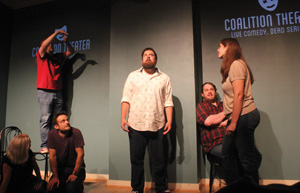Physicians Learn New Skills in the Theater
Catherine Grossman, M.D., H’06, doesn’t expect any of the residents she supervises to ever pursue a career on stage, as entertaining as they may be. But she does see the value in learning theatrical improvisation skills. This year she incorporated an improv workshop into residency training.
Medicine, like theater, she believes, is an art as well as a skill, and improvisation enables residents to use different parts of the brain and approach ideas through a new lens.
“The millennial learner needs to be actively engaged and this is one way we engage them,” she said.
Grossman, associate professor of internal medicine, is not the first to see the parallel between art and science. Medical improv is an emerging field designed to improve cognition, communication and teamwork in medical settings. Actor Alan Alda was recently honored by Stony Brook University for helping to establish a center using improvisation techniques to aid in communicating scientific information.
To get the most from improv, performer and teacher Townsend Hart says you should:
- Leave your ego at the door.
- Be open to feedback.
- Ask for help.
Grossman was introduced to improvisation during a medical simulation course at Harvard and recognized its value as a teaching tool. After an introductory class, she signed up for more.
“It was really neat looking at how the skills transferred back and forth. It made me think about how I teach, how I am at adapting rapidly, being in the moment and responding.”
When she returned to Richmond, Grossman contacted the Richmond Comedy Coalition.
“Improv can be very funny, but it’s more than making jokes on stage,” said Matt Newman, the Coalition’s managing director. “You really need to listen and respond to your scene partner with openness, honesty and empathy. It helps you become a more thoughtful and responsive communicator.”
Grant Farr, D.O., a chief resident in internal medicine who participated in the workshop, agreed. “Improv can help you express yourself so people will listen,” he said. Besides being fun, he added, it also helped loosen up the Type A personalities in his class.
Grossman, who was honored last fall for her innovative approach to education with the medical school’s Irby-James Award for Excellence in Clinical Teaching, notes that improv also is used in the school’s simulation center, where actors portray patients and physicians-in-training are required to react quickly.
Grossman has found her improv skills handy in many areas. “In improv, like real life, you have no idea how someone is going to respond.
“We’re always looking for ways to apply techniques from other fields into the way we teach. It’s interesting for me to work through different problems with different approaches. We’re walking down different pathways to be better at what we do.”
By Lisa Crutchfield
